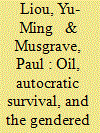|
|
|
Sort Order |
|
|
|
Items / Page
|
|
|
|
|
|
|
| Srl | Item |
| 1 |
ID:
142804


|
|
|
|
|
| Summary/Abstract |
For decades, China has been countering U.S. naval strengths with asymmetric capabilities, not by matching them. Yet, China is now building aircraft carriers. Why? It is not a sign of strength but rather history is replete with examples, including two from the Cold War, of weaker states imitating more advanced rivals rather than pursuing their own “disruptive” innovations.
|
|
|
|
|
|
|
|
|
|
|
|
|
|
|
|
| 2 |
ID:
148032


|
|
|
|
|
| Summary/Abstract |
Economic development generally promotes women’s autonomy. Yet women in resource-rich autocracies fare more poorly than women in similarly wealthy industrial and postindustrial states. Some attribute this puzzling outcome to cultural causes, describing the apparent link between restrictions on women’s autonomy in resource-rich countries (especially in the Middle East) as spurious. Others argue that oil and gas rents cause a gendered resource curse through macroeconomic mechanisms. By contrast, we explain the association as a consequence of a political mechanism. We propose a theory of autocratic survival via antisocial policies chosen for the harms they inflict on targeted groups. Autocrats need to placate ideologically motivated members of their winning coalition. Antisocial policies serve as a costly and visible measure of rulers’ fidelity to these winning coalition members. Resource rents enable rulers to afford such policies, which would be infeasible in tax-reliant regimes. Restricting women’s autonomy thus forms part of a strategy of autocratic rule in resource-rich autocracies. Using quantitative evidence, we demonstrate that variations in women’s autonomy correlate with variations in oil income per capita in cross-country regressions. To trace variations within cases, we present case studies of Saudi Arabia and Iran to demonstrate processes consonant with our theory.
|
|
|
|
|
|
|
|
|
|
|
|
|
|
|
|
| 3 |
ID:
186597


|
|
|
|
|
| Summary/Abstract |
What determines public support for trade liberalization? Scholars of international political economy have generally focused on the effects of openness on employment via individuals’ skill level, sector, or occupation. Recent developments in trade economics suggest that the characteristics of individual citizens’ employing firms may also shape their attitudes on trade policy. In this paper, using under-explored survey data combining trade opinion with measures of employer productivity (from the 2008 Japanese General Social Survey), we present evidence that employees of more productive, more globalized firms are much more supportive of trade openness than employees of less productive, domestically oriented firms, even when accounting for skill level and sectoral and occupational characteristics. Moreover, we find evidence that the effects of these characteristics described in the literature are conditioned by globalized firm employment. Last, we find that the effect of globalized firm employment is conditioned by employees’ relative position within their firms. Those who are more likely to benefit directly from firm success—such as permanent employees and managers—hold the most pro-trade preferences. These findings suggest that economic interests affect individual policy preferences in more nuanced ways than previously recognized.
|
|
|
|
|
|
|
|
|
|
|
|
|
|
|
|
|
|
|
|
|